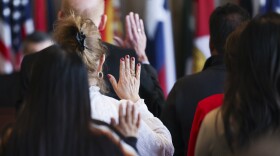The city of Plano has offered a citizenship workshop for its large immigrant community for almost two decades. And this year’s workshop had a big turnout — at a time when the second Trump administration is launching many draconian immigration measures.
Plano ISD’s Sockwell Center’s large parking lot was almost full on Saturday.
The room smells like Indian food — it’s free from a local restaurant. People are standing in a long line to grab a plate. They’re chatting in different languages while they wait.
Plano is known for its diversity. The city is about 23% Asian and around 16% Hispanic according to data from the U.S. Census.
Chanda Parbhoo said it wasn’t always that way. She remembers growing up in Plano as one of a few South Asian student in her class.
“Every corner in Plano has either a grocery store or has a clothing store or some kind of South Asian business, so we've seen a dramatic change,” Parbhoo said.
Parbhoo founded South Asian American Voter Empowerment and the South Asian American Voter Empowerment Education Fund to advocate for South Asians in Texas. Her organization helps register people at citizenship ceremonies. Parbhoo said it brings back memories of when she became a naturalized citizen in 1984.
“It catches me by the heart every time going into that ceremony and just listening to the oath, it just kind of comes back like a movie reel,” she said.
The citizenship process has several requirements. Plano’s Multicultural Outreach Roundtable hosts its annual workshop to guide green card holders through it. Volunteers at the event pass out boxes of red flashcards for studying.
There are pro bono attorneys giving presentations about the citizenship test and background check. A woman is translating the attorney’s presentation in Spanish into an earpiece that’s connected to listening devices.

Green card holders are legal permanent residents. They can apply for citizenship after a few years depending on if they got their green card through work or marriage.
North Texas immigration attorney Michelle Saenz-Rodriguez said the immigration process — whether it’s citizenship or a work visa — is complicated.
And then President Donald Trump issued dozens of executive orders on immigration.
“It's absolute craziness,” Saenz-Rodriguez said. “We looked at this and we're like, wait, what? What am I looking at here?”
Many of those executive orders focused on people who are in the United State without legal status. They’ve included building a wall at the border with Mexico and sending troops to aid enforcement. Two federal judges blocked an order that would’ve ended birthright citizenship for children born to parents without legal status.
Anush Arumugam said he’s concerned about the executive orders. He immigrated on a student visa and now has a green card through work and is eligible to apply for citizenship, which is why he went to the workshop.

Arumugam said the public has misconceptions about immigrants.
“A common thing is connecting immigration and crime, which is not a thing at all,” he said. “And another common thing is to connect illegal immigration and legal immigration. There should be clear separation of that.”
But Saenz-Rodriguez said many legal immigrants are still worried about how the Trump administration’s immigration policies will impact their status — even naturalized citizens.
She said it’s hard for advocates and experts to keep up with the president’s executive orders on immigration and how they’ll impact their clients. But Saenz-Rodriguez said the chaos is intentional.
Saenz-Rodriguez says advocates are playing triage as they respond to the new policies, something they’ll have to keep up for the next few years.
“You become numb because of everything that's coming out, and it really is like drinking water out of a fire hose,” she said.
Got a tip? Email Caroline Love at clove@kera.org.
Caroline Love is a Report For America corps member for KERA News.
KERA News is made possible through the generosity of our members. If you find this reporting valuable, consider making a tax-deductible gift today. Thank you.





